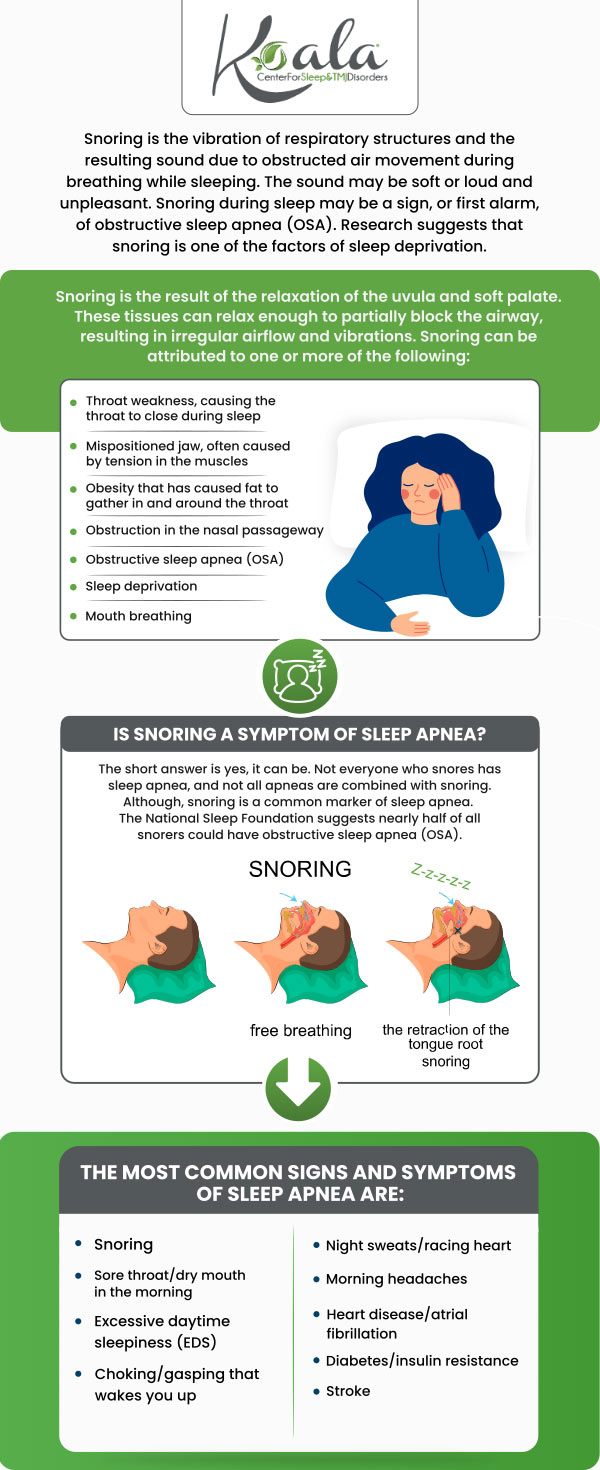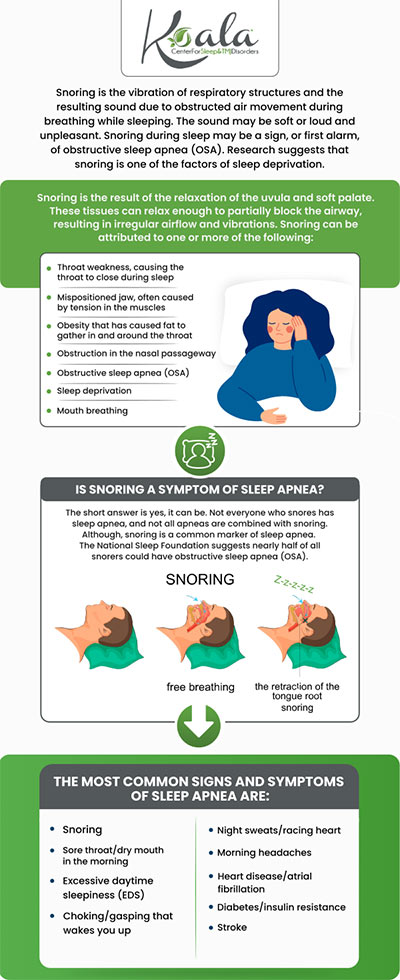Will Elevating My Head Help With Snoring?
If you are suffering from snoring, elevating your head while sleeping can help you. But if this does not solve your problem, visit Koala® Center For Sleep & TMJ Disorders for comprehensive treatment. For more information contact us or book an appointment online. We have convenient locations across the U.S. in Bloomington IL, Peoria/Dunlap IL, El Paso TX, and Wausau WI.


Table of Contents:
Does sleeping with your head elevated help snoring?
Is it better to sleep flat or elevated for snoring?
What is the best position to sleep in to stop snoring?
Elevating your head while sleeping can reduce snoring in many cases. This method targets snoring caused by obstructive sleep apnea and positional snoring. These conditions are some of the most prevalent sleep-related breathing issues.
When you elevate your head, either by using extra pillows or an adjustable bed, it changes the alignment of your airway. This can prevent the tongue and soft palate from obstructing the back of your throat, which is a common reason for snoring. If you keep your head elevated, the airflow is less obstructed, so snoring sounds are reduced.
However, it’s important to remember that elevating your head may not solve snoring for everyone. This is because snoring can have various causes, including obesity, alcohol consumption, smoking, and structural issues in the airway. In these cases, simply elevating the head may not be sufficient to fully address the causes of snoring.
If you continue to snore despite trying head elevation, it’s recommended to consult a sleep professional. Our knowledgeable professionals can evaluate your specific situation, identify any underlying issues, and recommend personalized treatments to help you sleep better. The most common treatment options for snoring include lifestyle modifications, positional therapy, and medical devices like continuous positive airway pressure (CPAP) machines.
For some people, sleeping with their heads elevated can be very beneficial. Elevating the head helps keep the airway more open and prevents the tongue and soft palate from sliding backward. This can be especially helpful for positional snorers.
On the other hand, other people find that sleeping flat works better for them. Elevating the head may not make a significant difference in their snoring or can sometimes contribute to the issue. The choice between sleeping flat or elevated depends on your specific anatomy and the root cause of your snoring. It’s crucial to consider various lifestyle factors that can contribute to snoring, such as alcohol consumption, smoking, and obesity. Furthermore, snoring can be a symptom of a more serious sleep disorder, such as sleep apnea.
If you or a loved one is struggling with chronic snoring that disrupts sleep or is accompanied by other concerning symptoms like choking or gasping for air during sleep, it’s highly recommended to consult a sleep expert at Koala® Center For Sleep & TMJ Disorders. We can help you determine what sleeping positions or treatments will allow you to get the best quality sleep.
The most optimal sleeping position to minimize your snoring depends on the specific factors contributing to the issue. Some ways to reduce snoring include:
• Side sleeping – Sleeping on your side can prevent your tongue and soft palate from collapsing to the back of your throat, which can obstruct the airway and lead to snoring. If you typically sleep on your back, it’s encouraged to try using a body pillow to get accustomed to side sleeping.
• Elevating your head – Many people report finding relief after elevating their head by using extra pillows to prop it up. This keeps the airway more open and reduces the likelihood of snoring.
Additionally, it’s advised to:
• Limit alcohol and sedatives – These substances can relax the muscles in your throat and make snoring more likely. By avoiding these substances, especially in the evening, you can minimize your chances of snoring.
• Stay hydrated – Dehydration can worsen snoring, so it’s crucial to stay well hydrated throughout the day and before bedtime.
• Maintain a healthy weight – Excess weight, especially around the neck, can put pressure on the airway and contribute to snoring. It’s important to engage in healthy habits such as sticking to a balanced diet and exercising regularly.
If you suspect that a medical condition like sleep apnea is behind your snoring, it’s essential to seek a professional’s expertise.

Additional Services You May Need
▸ KoalaKIDZzz®
▸ Sleep Apnea
▸ Snoring
▸ TMJ Disorder
▸ Fatigue
▸ Sleep Disorders
▸ Weight Loss
▸ CPAP Alternative
▸ Oral Appliances




